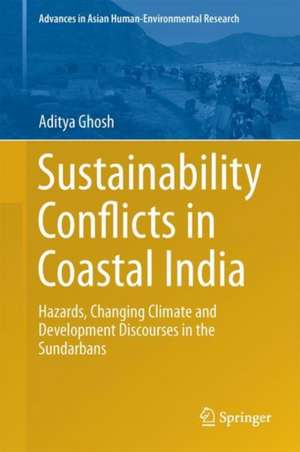Sustainability Conflicts in Coastal India: Hazards, Changing Climate and Development Discourses in the Sundarbans: Advances in Asian Human-Environmental Research
Autor Aditya Ghoshen Limba Engleză Hardback – 14 dec 2017
| Toate formatele și edițiile | Preț | Express |
|---|---|---|
| Paperback (1) | 556.58 lei 38-44 zile | |
| Springer International Publishing – 5 sep 2018 | 556.58 lei 38-44 zile | |
| Hardback (1) | 645.28 lei 43-57 zile | |
| Springer International Publishing – 14 dec 2017 | 645.28 lei 43-57 zile |
Din seria Advances in Asian Human-Environmental Research
- 18%
 Preț: 956.81 lei
Preț: 956.81 lei - 20%
 Preț: 559.99 lei
Preț: 559.99 lei - 18%
 Preț: 890.54 lei
Preț: 890.54 lei - 18%
 Preț: 788.72 lei
Preț: 788.72 lei - 15%
 Preț: 645.47 lei
Preț: 645.47 lei - 24%
 Preț: 725.18 lei
Preț: 725.18 lei - 18%
 Preț: 948.16 lei
Preț: 948.16 lei - 18%
 Preț: 787.78 lei
Preț: 787.78 lei - 15%
 Preț: 640.37 lei
Preț: 640.37 lei - 15%
 Preț: 646.43 lei
Preț: 646.43 lei - 15%
 Preț: 665.58 lei
Preț: 665.58 lei - 18%
 Preț: 948.16 lei
Preț: 948.16 lei - 15%
 Preț: 635.31 lei
Preț: 635.31 lei - 20%
 Preț: 578.29 lei
Preț: 578.29 lei - 15%
 Preț: 647.73 lei
Preț: 647.73 lei - 18%
 Preț: 1029.13 lei
Preț: 1029.13 lei - 15%
 Preț: 640.06 lei
Preț: 640.06 lei - 18%
 Preț: 950.52 lei
Preț: 950.52 lei - 18%
 Preț: 1575.88 lei
Preț: 1575.88 lei - 15%
 Preț: 642.18 lei
Preț: 642.18 lei - 18%
 Preț: 896.08 lei
Preț: 896.08 lei - 15%
 Preț: 639.41 lei
Preț: 639.41 lei - 15%
 Preț: 641.03 lei
Preț: 641.03 lei - 18%
 Preț: 954.62 lei
Preț: 954.62 lei - 15%
 Preț: 642.51 lei
Preț: 642.51 lei - 15%
 Preț: 644.95 lei
Preț: 644.95 lei - 18%
 Preț: 1023.74 lei
Preț: 1023.74 lei - 18%
 Preț: 954.31 lei
Preț: 954.31 lei - 15%
 Preț: 640.55 lei
Preț: 640.55 lei - 15%
 Preț: 644.18 lei
Preț: 644.18 lei - 15%
 Preț: 641.71 lei
Preț: 641.71 lei - 18%
 Preț: 938.21 lei
Preț: 938.21 lei - 15%
 Preț: 644.18 lei
Preț: 644.18 lei
Preț: 645.28 lei
Preț vechi: 759.15 lei
-15% Nou
Puncte Express: 968
Preț estimativ în valută:
123.47€ • 129.26$ • 102.17£
123.47€ • 129.26$ • 102.17£
Carte tipărită la comandă
Livrare economică 07-21 aprilie
Preluare comenzi: 021 569.72.76
Specificații
ISBN-13: 9783319638911
ISBN-10: 3319638912
Pagini: 247
Ilustrații: XIX, 245 p. 53 illus., 49 illus. in color.
Dimensiuni: 155 x 235 mm
Greutate: 0.55 kg
Ediția:1st ed. 2018
Editura: Springer International Publishing
Colecția Springer
Seria Advances in Asian Human-Environmental Research
Locul publicării:Cham, Switzerland
ISBN-10: 3319638912
Pagini: 247
Ilustrații: XIX, 245 p. 53 illus., 49 illus. in color.
Dimensiuni: 155 x 235 mm
Greutate: 0.55 kg
Ediția:1st ed. 2018
Editura: Springer International Publishing
Colecția Springer
Seria Advances in Asian Human-Environmental Research
Locul publicării:Cham, Switzerland
Cuprins
Part I. 'Devil’ in the deep blue sea?: 1. Warming world, threatened poor.- 2. Recipe of a disaster: Peripheral lives in the epicentre of changing climate.- Part II. Digging deep: Evidence and Empiricism: 3. Dusting the layers: Evolution of vulnerabilities.- 4. Is Science Sacred?.- 5. Discursive dissonance in socio-ecological theatre.- 6. Are comments free? Where consents manufacture.- Part III. Joining the Isles: 7. For the comfortably numb: Conclusion summary.- Postscript.- Reference.
Notă biografică
Aditya Ghosh graduated with a PhD from the University of Heidelberg and has studied at the University of Sussex, University of Calcutta, University of Mumbai, and the University of Lincoln. Aditya specializes in sustainable development, climate change and socio-ecological systems.
Textul de pe ultima copertă
This multidisciplinary work analyses challenges to sustainable development amidst rapidly changing climate in the world’s largest delta – the Sundarbans. Empirical evidence unpacks grounded vulnerabilities and reveals their temporal socio-economic impacts. A novel concept of ‘everyday disasters’ is proposed – supported by data and photographic evidence – that contests institutional disaster definition. Then it uncovers how the geopolitics of ecological governance and its hegemonic discourse dominate local policies, which in turn fail to address local socio-ecological concerns, adaptation needs and development aspirations. Absence of local vocabularies, cognitive values and socio-cultural contexts along with spatially constricted, exclusionary, top-down techno-science approaches further escalate knowledge-action gaps. Deconstruction of multiscalar conflicts between the global rhetoric and transformative postcolonial geographies offers an ethical, Southern perspectiveof sustainability.
Caracteristici
Provides diverse empirical evidence on disaster risks, climate change adaptation, policy discourses and sustainability governance to deconstruct them. Analyses over 900 media reports, three-decade long socio-economic data and presents over 50 visuals from actual disaster situations Simulates actual socio-ecological scenarios of sustainable development and climate change adaptation, unpacking the entire breadth of entanglements spread across spatial scales, probably for the first time Identifies knowledge gaps, knowledge-actions gaps, barriers and synergies to sustainable development in the Global South. Constructs a framework to facilitate co-production of knowledge and reflexivity by hybridising the socio-cultural with the techno-scientific
